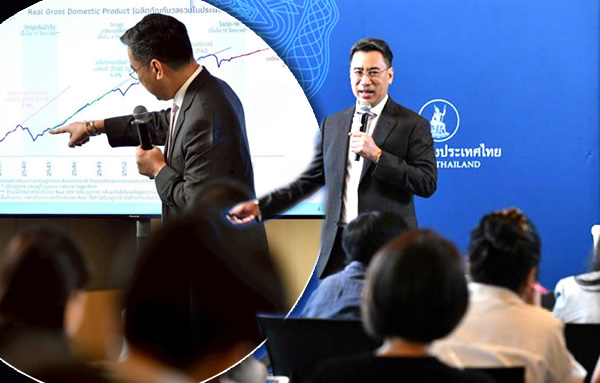Outgoing Bank of Thailand boss warns of a possible credit downgrade. Tourism engine has not recovered
By Joseph O’ Connor
Copyright thaiexaminer

Outgoing Bank of Thailand governor Sethaput Suthiwartnarueput warns Thailand risks a credit downgrade as tourism falters, government spending rises, income lags and the economy remains dependent on short-term stimulus without urgent structural reforms.
Outgoing Bank of Thailand Governor Sethaput Suthiwartnarueput on Tuesday delivered a stark warning: Thailand risks a credit downgrade if the government does not change course. He recalled starting his tenure amid the depths of the COVID-19 crisis and said the kingdom still has not recovered. Emergency measures meant to support the economy have become crutches, and fiscal stimulus cannot replace real, fundamental structural reform. Tourism remains in crisis, with Thailand now overtaken by Vietnam for Chinese visitors. Meanwhile, government spending keeps rising while income lags far behind. He added that the incoming interim government risks prolonging political instability, and as a result, budget disbursement in 2026 is set to suffer. In turn, he predicted reduced GDP growth of only 1.6%
Thailand’s outgoing central bank governor issued a sharp, no-nonsense warning to the incoming government. On Tuesday, Bank of Thailand Governor Sethaput Suthiwartnarueput laid out five turbulent years of economic oversight — and what he sees as looming dangers ahead. He made it clear: without structural reforms, Thailand’s economy will remain stuck in low gear.
From the start, Sethaput was frank. Despite numerous government interventions, the Thai economy still hasn’t fully recovered from the COVID-19 crisis of 2020–2021. According to him, the country remains dependent on short-term fixes. In particular, stimulus measures introduced during the pandemic have not been wound down. Worse still, these measures do little to promote long-term growth.
Thailand still relies on temporary pandemic measures and fiscal stimulus fails to deliver sustainable growth
Notably, Sethaput singled out Thailand’s tourism sector as a key area of concern. Although tourism was once the kingdom’s most powerful growth engine, it is now struggling. Foreign arrivals have dropped, safety perceptions have worsened, and the industry’s global image has taken a beating. Thailand, he said, has failed to address the issue of tourist safety, a factor he considers critical to reviving confidence in the sector.
According to recent data, Thailand recorded a 7.08% drop in foreign tourist arrivals from January 1 to September 14, compared to the same period last year. That translates to a loss of millions of visitors. The Tourism and Sports Ministry confirmed the number: 23 million tourists, down sharply from earlier expectations. In August, authorities had already cut the full-year target to 33 million, down from 37 million. It’s a far cry from the pre-pandemic peak of 40 million visitors in 2019.
But the damage is not just to tourism. Sethaput also warned that Thailand’s budget planning is under severe pressure. The country is now governed by an interim administration. As a result, budget disbursements are likely to stall for at least four months, until after the next general election and cabinet formation.
Tourism struggles and government instability threaten recovery and disrupt budget disbursements
This uncertainty could bring real pain. According to the central bank’s forecasts, Thailand’s GDP growth in 2026 will drop to just 1.6%. Sethaput admitted there were significant downside risks even to that modest figure. While 2025 may still see a 2.3% growth rate, the second half of the year is expected to slow to near 1%, with momentum weakening fast.
Meanwhile, public finances are moving in the wrong direction. Over the last five years, government expenditure has increased by 4% annually. However, revenue has only grown at 1.7% per year. Consequently, the fiscal gap is widening. “If we continue on this path, the risks are serious,” Sethaput said. “A credit rating downgrade is no longer unthinkable.” A downgrade, he warned, would make borrowing more expensive for Thailand. It would hit already-stressed households, fragile businesses, and the broader economy. As things stand, Thailand’s debt-to-GDP ratio is rising, not falling. This is despite earlier promises of fiscal consolidation.
Slowing GDP growth and widening fiscal gaps raise the risk of a credit downgrade for Thailand
Still, Sethaput insists Thailand is not yet in a fiscal crisis. However, the country is entering dangerous territory. “Now is not the time for complacency,” he said. Instead, the government must act decisively to repair its fiscal foundations. That means cutting spending and planning for stronger revenue — sooner rather than later.
Importantly, he urged the incoming administration not to fall into the familiar trap of short-term populism. While some short-term stimulus is understandable, especially in a four-month caretaker period, the temptation to overuse it must be resisted. Programs like the “Half-Half” subsidy, though popular, can create what Sethaput called “stimulus addiction.”
Therefore, he argued, any spending must be aligned with medium-term fiscal discipline. If significant budgets are allocated for short-term programs, they must be matched by plans to increase revenue. That could include tax adjustments, a sensitive but necessary discussion if Thailand wants to avoid damaging its creditworthiness.
Meanwhile, Sethaput addressed several other pressure points in Thailand’s economy. He pointed to growing public anxiety over debt, particularly among vulnerable borrowers. According to him, monetary easing has been used carefully.
Interest rate cuts and debt programs aimed at easing financial strain for struggling households and businesses
From late 2024 to August 2025, the policy interest rate was reduced in four steps to 1.5%. But this wasn’t meant to stimulate demand. Instead, it was a tool to ease financial conditions and help struggling households stay afloat.
In this context, the “You Fight, We Help” program remains critical. The initiative aims to assist borrowers who are trying to preserve their assets and stay solvent. Yet Sethaput emphasised that no interest rate cut can solve the deeper problem. Real debt resolution requires higher income, and income growth is only possible through structural economic change.
Furthermore, Sethaput flagged new global challenges affecting Thailand. Protectionist trade policies, especially from the United States, are putting pressure on exports and manufacturing. He warned that Thailand’s industries must adapt more quickly. External shocks, he said, are now a regular feature of the global landscape.
Despite the grim tone, Sethaput took time to reflect on his tenure. Over the last five years, the Bank of Thailand managed four distinct economic phases. First, there was the COVID-19 crash, which saw interest rates slashed to 0.5%. Then came the early recovery in 2022, when rates rose to 2.5%. That was followed by a period of policy space preservation, anticipating future global shocks. Finally, in 2025, came a measured easing cycle, cutting rates to the current 1.5%.
Bank of Thailand navigated four economic phases with flexible policy adjustments during recovery
However, another challenge emerged in 2025: the rapid strengthening of the Thai baht. From January onward, the currency appreciated by 7%. Sethaput attributed this to a weakening US dollar and an increase in baht-based gold trading. Thais tend to trade gold in their own currency, which caused strong baht inflows. As a result, discussions have begun about taxing gold or denominating gold trades in US dollars.
Still, Sethaput was firm: the Bank of Thailand does not try to dictate the exchange rate. Instead, it works to reduce volatility and protect exporters from extreme swings.
At the end of his term, Sethaput also addressed rumours of bank account freezes and panic withdrawals. He dismissed the claims. Liquidity across Thai banks remains normal, he confirmed. Any localised cash shortages were temporary. He acknowledged, however, that enforcement of anti-fraud measures may have inconvenienced some innocent account holders.
Rapid baht appreciation and banking concerns addressed with monitoring and measures to reduce volatility
Looking back, he reflected on the lessons learned. First, crisis policies must have exit plans. He cited the 1997 VAT cut, which was meant to be temporary but remains in place. Second, policy communication must be clear. He admitted the public still misunderstands the “Responsible Lending” framework. A more accessible name, he said, might have helped.
Finally, he mentioned delays in launching the Your Data platform, a major project aimed at improving access to financial services. Despite its importance, implementation came late.
Top economist warns of a stronger baht as the US economy weakens. Tourism and exports face a severe hit
Rate cut anticipated as outgoing Bank of Thailand governor attends last Monetary Policy Committee
Game changer US Thai trade deal approved at special cabinet meeting as 19% tariff rate warmly welcomed
In conclusion, Sethaput’s final message was blunt. Thailand faces a slowdown, a possible credit downgrade, and a tourism reputation crisis. Yet these challenges are not insurmountable. With structural reform, fiscal discipline, and better planning, the country can get back on track.
But time is running out. The next government has only months to act before the next budget cycle. The risks are clear, the path is narrow, and the cost of delay could be severe. As Sethaput hands over the reins, he leaves behind not just a legacy of cautious policy — but a call to action Thailand can no longer ignore.
Join the Thai News forum, follow Thai Examiner on Facebook here
Receive all our stories as they come out on Telegram here
Follow Thai Examiner here
Further reading



